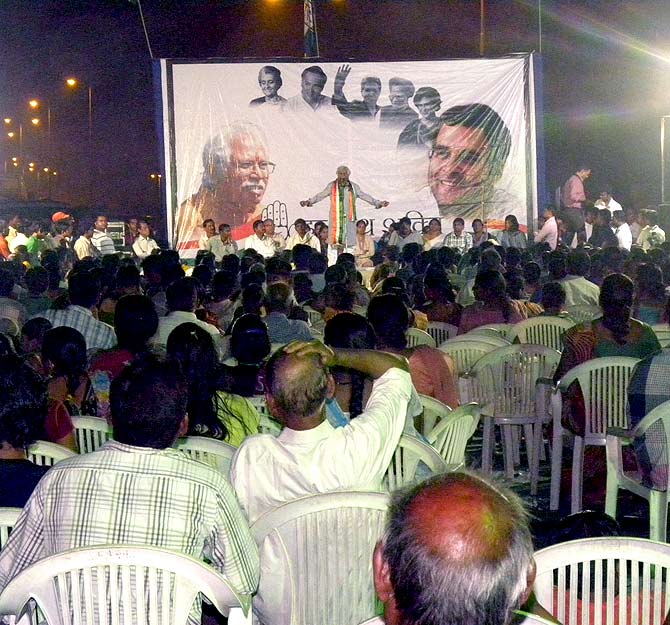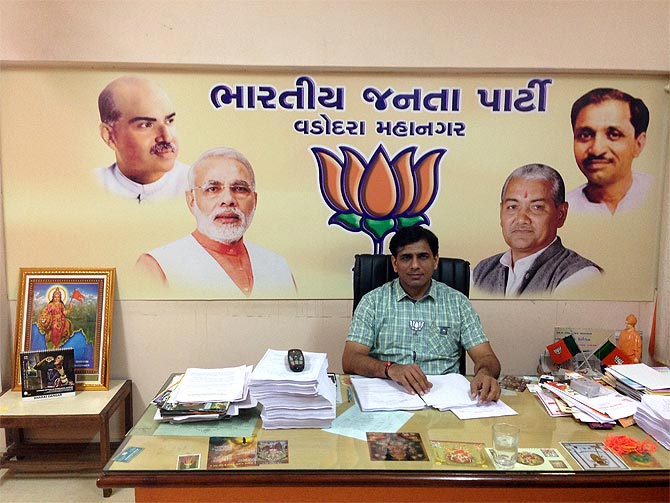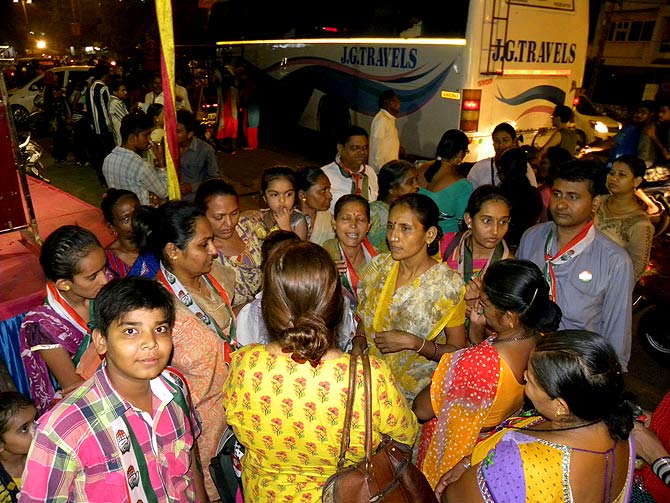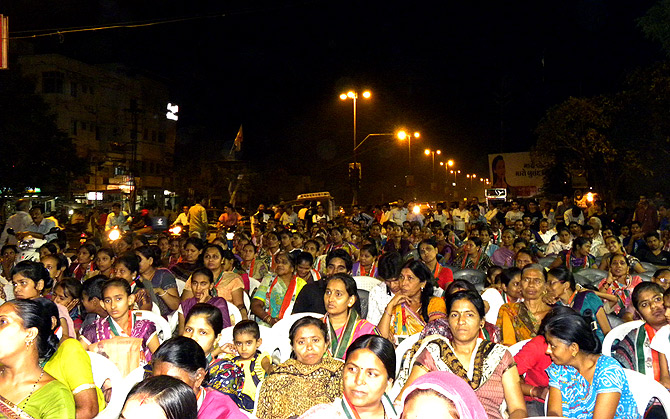 | « Back to article | Print this article |
The constituency where Modi does not need to campaign
The BJP has 10,000 registered members in Vadodara and their most important strategy has been to pay special attention to the electoral list, which runs to 25,000 pages, with between 45 and 48 voter names per page.
For each page, one resident on the page has been chosen the page pramukh whose job it is to mobilise the other 44 to 47 names on the page to vote for Modi.
'...He chose Vadodara because this is the most BJP-oriented constituency in Gujarat... This is the one constituency he doesn't have to bother about.'
Why is NaMo not in his constituency campaigning? Vaihayasi Pande Daniel/Rediff.com and Patrick Ward decided to find out.
There are 1.637 million Narendra Modis in Vadodara.
A trip to this city, also called Baroda, on the banks of the Vishwamitra river, in central Gujarat, brought about this startling discovery.
When you arrive in Baroda, the first thing you notice is the quiet.
Sure, the city is festively plastered with election posters.
Posters, brandishing a finger, encouraging folks to vote.
Posters and posters and posters and posters encouraging folks to vote for Narendra Modi.
They are there on every wall, underpass, bridge (many new ones have opened recently) and available space.
There are also billboards of Rahul Gandhi, his arm wrapped, in a brotherly fashion, around a potential voter, too; but not that many.
You may be mistaken, but in Modi's karmabhoomi, a real election buzz is not really there, a few days before polling day. That intangible chunav energy, which hangs in the air, when you enter an Indian town about to vote, seems absent.
There is no evident frenzy or tamasha. Or electoral noise. It is all pretty tame.
At the Bharatiya Janata Party's central office, in Sayajiganj, just before sundown, two days before campaigning is to end in the constituency, a solitary Modi-mobile (a nearly life-size cut out of Modi's head fronts its bonnet) is parked outside.
Robust devotional music spills out of speakers, into the lobby, as you enter the building, which has really smelly stairwells. The BJP office is busy, but not exactly humming.
Bharat Dangar, president, Bharatiya Janata Party, Vadodara City, who sits at a broad desk, with a lotus pinned to his chest (the rubber bands on his desk are saffron and he says they hand out saffron hairbands).
The faces of Modi, and other BJP politicians, form a panorama behind his head, affording him some additional heads, like a deity, makes time to speak about how the party is going about the last few days of campaigning.
He has all the constituency facts at his fingertips and can reel out any stats. This BJP man brims with confidence. And self-satisfaction. As far as he is concerned, the constituency has already been won and Modi is well on his way to 7, Race Course Road.
No one need wait for May 16.
"You can ask any of the Baroda citizens. Everyone knows Modiji will win with a big margin. We want to create a history over here."
"This is the first chance (that) a Gujarati, as a Barodian, will vote for the PM and not (just) for the MP. We have 543 constituencies in India. Among the 543 only two of them -- Varanasi and Vadodara -- vote for the PM. The rest vote for the MP. We are the lucky ones. We know we are going to vote for the PM of the nation. Now it is decided. After the fifth or sixth phase (of voting) it was clear, very clear that the BJP will come in the power, NDA (the National Democratic Alliance)will come in the power. And Narendra Modi will become the prime minister of the India. It is a very proud for us to work for the Narendrabhai, to work for the Modiji, campaign for the Modiji."
Please click NEXT to read further...
'Everyone here is Narendra Modi'
Modi stopped by for a large rally, on April 24 from 8 am to noon. And he is not likely to return.
Doesn't Modi need to visit the city to ensure a significant win?
"Not needed," says Dangar. "Everyone here is Narendra Modi. He himself said at our public meeting. Everyone here is a Narendra Modi. Why should I take stress because everyone here is a Narendra Modi? Not by birth. But by their work."
So by Dangar, and apparently Modi's logic, Baroda is a city of 1.637 million Modis.
He readily agrees with your verdict that the electoral buzz is hard to pick up around here -- "Not that much of voices or noise over here. Not too much of rallies." Dangar says the reason is that they are taking great care to follow the Election Commission's Model Code of Conduct.
What is not evident, he says, is the extensive door-to-door and meeting-based campaigning the BJP is doing, even in rural areas (consisting of some 500,000 voters). "Group meetings, from small groups to big society-wise meetings (as well as) samaj or caste-wise meetings. Profession-wise meetings too... In rural areas we have a seven-rath mini truck."
Most of their work is volunteer-driven, Dangar explains -- the BJP has 10,000 registered members/workers in Vadodara and, he says, many more volunteers -- and their most important strategy has been to pay special attention to the electoral list, which runs to 25,000 pages, with between 45 and 48 voter names per page, roughly 10 to 12 families.
For each page, one resident on the page has been chosen the page pramukh or president whose job it is to mobilise the other 44 to 47 names on the page to vote for Modi.
So how many Page Pramukhs does he have? "25,000!" says Danger with glee.
Please click NEXT to read further...
'The first thing Modi will do is declare a war with Pakistan'
If there is a spark of electioneering activity visible, a few days before polling, it is at the Congress candidate's rallies.
Taking on Modi in a constituency, where it is predicted he will triumph with a margin never seen before, is all about guts and no glory. And Madhusudan Mistry is exactly that kind of feisty fighter as he addresses shockingly tiny rallies, compared to the extensive Namo extravaganzas, like a hyperactive stage actor without an audience.
He matches the over-confident BJP hyperbole with excessive hyperbole of his own.
It must be a very tough fight for him? Why did he take it up? "Why not? When Enoch Powell (the British politician notorious for his controversial Rivers of Blood speech against immigration) contested in Britain, somebody took him on as well. He lost. But they fought," says Mistry, drawing a parallel between Powell and Modi.
Somebody has to stop Modi?
"Yes. Someone has to expose him. What sort of person he is. What his development model is. I would say it is purely a facade or mask on his face. He talks about development. In the back of his mind is a very clear cut vertical divide that he wants to inject between Hindus and Muslims."
"If he ever gets elected and if he ever becomes the prime minister, the first thing he will do is declare a war with Pakistan, to get himself established as a hero in the Indian psyche. His rhetoric against the Muslims and the minorities will continue."
What has is the best change Modi has brought in the state? Mistry shrugs. "Tell me in which sector is Gujarat leading the country. Tell me one. Manufacturing, services, industry, agriculture, health, education? Which sector? IT. Name one?"
Please click NEXT to read further...
'Why would I not vote for the Congress? They look out for the poor!'
Mistry, who sports a mop of long white hair, is a mean speaker, attempting to fire up the audience, at Vagodia area in Savli.
But it is at best a dull show.
The audience sits collapsed in their white plastic chairs, listening attentively, but not very responsive. And Mistry's arrival does not grow the crowd. Phones are not held up to capture pictures or videos, as happens at more popular rallies. The rally, which takes place on the side of the road, causes the traffic to only occasionally pause.
Someone might stop by on their scooter to hear Mistry for just a few minutes and then go on. Occasionally a passerby yells a jibe. "We have had enough of Congress." Or "Ab ki baar Modi sarkar".
A bunch of women at the front of the rally, when approached, mentioning that you are a journalist and are interested in their views, swamp you, pushing forward to surround you and talk about their life problems and beg you to visit their homes and see their plight.
"Why would I not vote for the Congress? They look out for the poor! Modi cannot even look after his wife," says Neelu, who works in a factory nearby, winding coils.
Geeta Rajput, from Vaghodia, who washes dishes for living and whose husband Ashok is a security guard, lives in one of the government-built slum housing projects, that have slowly started replacing the city's original slums.
She is upset that her home leaks bucket loads of water and she can find no one from the present city regime to solve this problem, politician or government official.
Kajol, about 12, stands at your elbow repeating sadly over and over again, "Didi, so much water keeps coming into our house."
Please click NEXT to read further...
'Modi never tells you the truth!'
It is about 9 pm and from Vagodia, Mistry heads to a rally at Raopura, an area where he believes he has good support (Raopura voted in a BJP MLA in the last assembly election; it is mixed area of Gujaratis, Uttar Pradesh migrants, Baroda Maharashtrians, Dalits and Adivasis).
He explains there are areas that are Congress dominated and areas that are BJP-dominated. When he goes to BJP areas he says, "You will certainly have very lukewarm support. But if you go in a Congress area you get overwhelming support."
The audience is certainly larger in Raopura. More attentive. But still not over-enthused. If one were to try to gauge the audience reaction it would seem they are here to judge if Mistry might make a better alternative, but are yet undecided.
The Rajput family sits outside their little home, listening, at the back of the rally. Says Chaya Rajput, 33, a housewife, and whose husband, who is in the Gujarat police and works at the central Police Bhavan. "At my sasural (in laws' place) all of us like Modi Sarkar. We like the work he has done very much. I have no fear (that he will bring divisive politics). Ever since I have grown up and matured I have been seeing his government."
They like what he has done in the state. The vikas. Especially with respect to education, roads, water, electricity. She says she believes that probably the area has some amount of Congress supporters.
For her the deciding factor has been the contrasts she sees between Maharashtra and Gujarat, when she goes to visit her sister in Shahada, Maharashtra, across the border from Gujarat in Nandubar district. "There is no light there. The roads are so dark. And when you reach the Gujarat border it is all ujwala (light)."
Ramesh Patel sits in the rally, listening to Mistry firing away on all cylinders. He has a government job and says he is disillusioned with the BJP government running the state, although the local corporator belongs to the Congress. "They have not done anything. We still have the same problems. Garbage, roads, water..."
Mistry says he works hard trying to attract disaffected voters to his cause. "You just have to go on talking to the people. With them. Explain to them. Mobilise them."
What does he like least about Mr Modi?
"I don't know! (Laughs) I have never answered this sort of question before..."
"He never tell you the truth. He is a five-step liar. He will tell one lie to a subordinate. And then he will convey it to one person. Then he will convey it to the fourth person. The fifth person will go out and tell. And from where it originates nobody knows."
Please click NEXT to read further...
'He chose Vadodara because this is the most BJP-oriented constituency in Gujarat'
The poor, be they hawkers or workers, according to Mistry, are still drawn to the Congress because the Modi Dream is not one they feel they can realise.
"It depends on what sort of person you talk and interview with. If they are people who are doing a little well economically they will naturally be siding with him. This has been the history of Gujarat. Wherever there was a good economic status we always supported the right wing people."
"We never supported the African National Congress in South Africa or a Labour Party in Britain or Labour in Australia. We are always with the Tories and in the US as well. This has been the psyche in the state with whoever is outside. Mainly those who have money will always be siding BJP."
Why did Modi choose Vadodara -- with 11,53,968 male voters, 10,71795 female voters and 34 other voters, as per the latest Gujarat census figures -- as his karmabhoomi?
Dr J S Bandukwala, former professor, MS University and a well-known human rights activist, who narrowly escaped death when his house was burned in the 2002 Gujarat riots, says: "He chose Vadodara because this is the most BJP-oriented constituency in Gujarat."
Because of the RSS impact from its headquarters in central Maharashtra?
"Not only the RSS impact. The impact of people abroad. This is also the Patel-Patidar area and every family has someone abroad. There is a very large population in America and they are very fanatical. Most of the Patels. This is their centre rather and towards Ahmedabad -- Anand, Nadiad. They are all settled in New Jersey and other areas. This is the one constituency he doesn't have to bother about."
If he wins both Varanasi and Vadodara, will Modi step down from the latter constituency?
"It is not our cup of tea (to think about this)," declares Dangar with a flourish, using the wrong metaphor. "Our aim is to make a historical victory."
If Modi gives up the Vadodara seat, will the Rajamata of Baroda, Shubhangini Raje Gaekwad, who proposed Modi's nomination for this constituency, along with chaiwallah Kiran Mahida and three others, and has run earlier from this seat, like to contest? "I might consider it if they think it's the right thing to do," the Rajmata told Rediff.com.
Modi will likely triumph from Vadodara, but will those industrious "25,000 page pramukhs" have success in bringing any of the city's approximately 300,000 Muslims to vote saffron?
Javed, a driver, who takes us around, says. "The (Gujarat) riots took place in 2002. Things have changed since then. Modi has found a place in our hearts. He has brought progress. He has provided jobs."
Says Bandukwala, who has retired in Baroda, but has a daughter and son settled in the US, and a Hindu Gujarati son-in-law: "I am a Muslim. We have faced the very brunt of his policies for the last 12 years. The result is that many Muslims have become resigned to him. They will just accept him for whatever he is. Which I can understand. Small people, in public, cannot say anything, for fear that there may be a reaction."
"Muslims are in a real trap just now," says the professor. "There is an intense fear also. If you go below the surface you will find an uneasiness. We don't know what is going to happen. We don't know. That fear is very deep. Society is completely communalised and divided. I don't know where we will be headed."
Baroda has a scarred history. Though some of the worst incidents of the 2002 Gujarat riots, that saw about 1,500 casualties, took place in Ahmedabad (111 km away), Vadodara suffered riots and deaths (about 36). Its proximity to Godhra meant that scores of Muslims fled from the Godhra area to Baroda. 2006 saw further Hindu-Muslim violence.
"The links between Baroda and Godhra are strong. The emotional links are very strong. In a town called Dahod, 100 people were killed," says Bandukwala, explaining that people from Vadodara ended up supporting those orphaned or made homeless or income-less in the Godhra area.
Is it possible that BJP might have gained Muslim voters, willing to put 2002 behind them??
Says Mistry: "I cannot answer that because I don't really know. But in the constituency I was representing (nearby Sabarkantha as a member of Parliament from 2001 to 2009) I don't think they have put it behind (them)."
Adds Bandukwala, "Muslims voting for Modi would be very low. Those who have joined with Modi have been ostracised in the community."
Bandukwala also doubts Modi's definition of development in a state, where he says the best indication of the lack of progress is the increasingly imbalanced sex ratio (according to the Gujarat census data the sex ratio in 2001 was 921 and 2011 it was 919) and the fact that nearly 2/5 children go to bed hungry (as per a report of the Comptroller and Auditor General of India).
Muslims, that one randomly quizzes in poorer less developed areas, where there is no sign of Modi's Gujarat model, are not interested in voting particularly, but will vote. Development? They have not heard of it.





